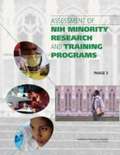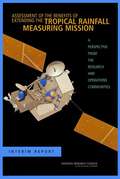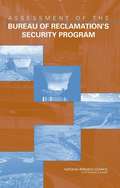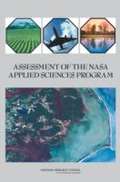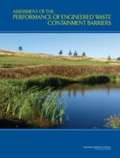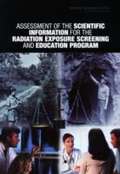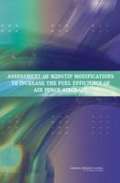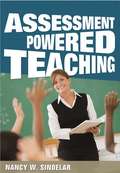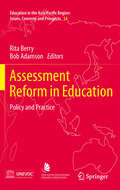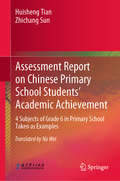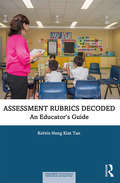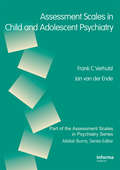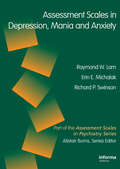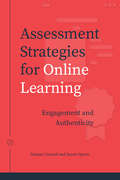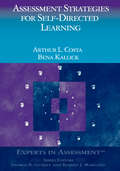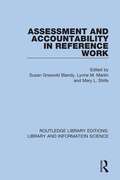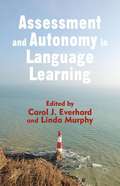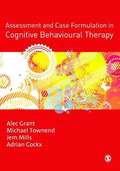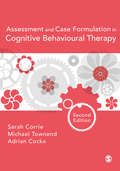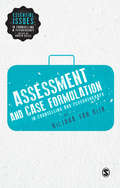- Table View
- List View
Assessment Of Nih Minority Research And Training Programs: Phase 3
by National Research Council of the National AcademiesThis report provides an assessment of NIH’s programs for increasing the participation in biomedical science of individuals from underrepresented minority groups. The report examines, using available data and the results of a survey of NIH trainees, the characteristics and outcomes of programs at the undergraduate, graduate, postdoctoral, and junior faculty levels. The report provides recommendations for improving these programs and their administration. It also recommends how NIH can improve the data it collects on trainees in all NIH research training programs so as to enhance training program evaluation.
Assessment Of The Benefits Of Extending The Tropical Rainfall Measuring Mission: A Perspective From The Research And Operations Communities
by National Research Council of the National AcademiesLaunched jointly in 1997 by the National Aeronautics and Space Administration (NASA) and the Japan Aerospace Exploration Agency (JAXA), the Tropical Rainfall Measuring Mission (TRMM) is a satellite mission that placed a unique suite of instruments, including the first precipitation radar, in space. These instruments are used to monitor and predict tropical cyclone tracks and intensity, estimate rainfall, and monitor climate variability (precipitation and sea surface temperature). TRMM has been collecting data for seven years; this data is used by the Joint Typhoon Warning Center, the National Center for Environmental Prediction, and the National Hurricane Center, among others worldwide. In July 2004, NASA announced that it would terminate TRMM in August 2004. At the request of the National Oceanic and Atmospheric Administration (NOAA), the White House, and the science community, NASA agreed to continue TRMM operations through the end of 2004. Meanwhile, NASA asked a National Research Council (NRC) committee to provide advice on the benefits of keeping TRMM in operation beyond 2004. After holding a workshop with a number of experts in the field, the committee found that TRMM will contribute significantly to operations and science if the mission is extended; and therefore, strongly recommends continued operation of TRMM with the caveat that cost and risk will need to be further examined before a final decision about the future of TRMM can be made.
Assessment Of The Bureau Of Reclamation's Security Program
by National Research Council of the National AcademiesThe water impounded behind a dam can be used to generate power and to provide water for drinking, irrigation, commerce, industry, and recreation. However, if a dam fails, the water that would be unleashed has the energy and power to cause mass destruction downstream, killing and injuring people and destroying property, agriculture, industry, and local and regional economies. The U.S. Bureau of Reclamation (Reclamation) is responsible for managing and operating some of this nation’s largest and most critical dams. The failure of one or more of these dams as the result of a malicious act would come with little warning and a limited time for evacuation. In the years since the 9/11 attacks, Reclamation has invested significant resources to establish and build a security program. Reclamation is now ready to evaluate the results of these efforts and determine how best to move forward to develop a security program that is robust and sustainable. This book assesses Reclamation’s security program and determines its level of preparedness to deter, respond to, and recover from malicious acts to its physical infrastructure and to the people who use and manage it.
Assessment Of The Nasa Applied Sciences Program
by National Research Council of the National AcademiesRemote sensing data and models from the National Aeronautics and Space Administration (NASA) are the basis for a wide spectrum of scientific research endeavors and are key inputs to many public and private services. The NASA Applied Sciences Program (ASP) and its precursors have been tasked with ensuring the extension of NASA Earth observation data and associated research into practical applications for society through external partnerships. With approximately five years having elapsed under the current ASP structure, and a growing government-wide emphasis on societal benefits in its Earth observing programs, NASA and the ASP leadership asked the National Research Council to assess ASP's approach in extending NASA research results to practical, societal applications. The report recommends that ASP partnerships should focus not only federal agencies but alsoon direct engagement of the broader community of users. The report also recommends that ASP enhance communication and feedback mechanisms with its partners, with the end users and beneficiaries of NASA data and research, and with the NASA organization.
Assessment Of The Performance Of Engineered Waste Containment Barriers
by National Research Council of the National AcademiesPresident Carter’s 1980 declaration of a state of emergency at Love Canal, New York, recognized that residents’ health had been affected by nearby chemical waste sites. The Resource Conservation and Recovery Act, enacted in 1976, ushered in a new era of waste management disposal designed to protect the public from harm. It required that modern waste containment systems use “engineered” barriers designed to isolate hazardous and toxic wastes and prevent them from seeping into the environment. These containment systems are now employed at thousands of waste sites around the United States, and their effectiveness must be continually monitored. Assessment of the Performance of Engineered Waste Containment Barriers assesses the performance of waste containment barriers to date. Existing data suggest that waste containment systems with liners and covers, when constructed and maintained in accordance with current regulations, are performing well thus far. However, they have not been in existence long enough to assess long-term (postclosure) performance, which may extend for hundreds of years. The book makes recommendations on how to improve future assessments and increase confidence in predictions of barrier system performance which will be of interest to policy makers, environmental interest groups, industrial waste producers, and industrial waste management industry.
Assessment Of The Scientific Information For The Radiation Exposure Screening And Education Program
by National Academy of Sciences of the National AcademiesThe Radiation Exposure Compensation Act (RECA) was set up by Congress in 1990 to compensate people who have been diagnosed with specified cancers and chronic diseases that could have resulted from exposure to nuclear-weapons tests at various U. S. test sites. Eligible claimants include civilian onsite participants, downwinders who lived in areas currently designated by RECA, and uranium workers and ore transporters who meet specified residence or exposure criteria. The Health Resources and Services Administration (HRSA), which oversees the screening, education, and referral services program for RECA populations, asked the National Academies to review its program and assess whether new scientific information could be used to improve its program and determine if additional populations or geographic areas should be covered under RECA. The report recommends Congress should establish a new science-based process using a method called "probability of causation/assigned share" (PC/AS) to determine eligibility for compensation. Because fallout may have been higher for people outside RECA-designated areas, the new PC/AS process should apply to all residents of the continental US, Alaska, Hawaii, and overseas US territories who have been diagnosed with specific RECA-compensable diseases and who may have been exposed, even in utero, to radiation from U. S. nuclear-weapons testing fallout. However, because the risks of radiation-induced disease are generally low at the exposure levels of concern in RECA populations, in most cases it is unlikely that exposure to radioactive fallout was a substantial contributing cause of cancer.
Assessment Of Wingtip Modifications To Increase The Fuel Efficiency Of Air Force Aircraft
by National Research Council of the National AcademiesThe high cost of aviation fuel has resulted in increased attention by Congress and the Air Force on improving military aircraft fuel efficiency. One action considered is modification of the aircraft’s wingtip by installing, for example, winglets to reduce drag. While common on commercial aircraft, such modifications have been less so on military aircraft. In an attempt to encourage greater Air Force use in this area, Congress, in H. Rept. 109-452, directed the Air Force to provide a report examining the feasibility of modifying its aircraft with winglets. To assist in this effort, the Air Force asked the NRC to evaluate its aircraft inventory and identify those aircraft that may be good candidates for winglet modifications. This report—which considers other wingtip modifications in addition to winglets—presents a review of wingtip modifications; an examination of previous analyses and experience with such modifications; and an assessment of wingtip modifications for various Air Force aircraft and potential investment strategies.
Assessment Powered Teaching
by Nancy W. SindelarKnowledge is power, and this book puts assessment data and instruction together in a step-by-step format. Instead of dreading the time testing takes from teaching, you can harness its power to define learning targets, build standards-based assessments; gather and use test data in the classroom, and develop data-driven teaching strategies. Assessment expert Nancy W. Sindelar provides practical tools that help teachers: * Use formative and summative assessment results to enhance instruction * Motivate students by providing clear learning targets * Utilize technology to analyze students’ progress * Raise test scores Included are testimonials from teachers, numerous data analysis examples, rubrics, and a chapter on culturally diverse schools. Designed to be adaptable, this book is a powerful resource for teachers, teacher teams, and all educators dedicated to enhancing student learning.
Assessment Reform in Education: Policy and Practice (Education in the Asia-Pacific Region: Issues, Concerns and Prospects #14)
by Bob Adamson Rita BerryThis book discusses the recent assessment movements in the eastern and western worlds with particular focuses on the policies, implementation, and impacts of assessment reform on education. A new perspective of assessment sees assessment as a means to enhance learning. This book examines the tensions, challenges and outcomes (intended and unintended) of assessment reform arising at the interface of policy and implementation, and implementation and student learning. The book reviews the experiences insights gained from research, and identifies the facilitators and hindrances to effective change. It reflects current thinking of assessment and provides the readers with ample background information of assessment development in many countries including USA, England, Scotland, Wales, Northern Ireland, Australia, Singapore, Taiwan, and Hong Kong.
Assessment Report on Chinese Primary School Students’ Academic Achievement: 4 Subjects of Grade 6 in Primary School Taken as Examples
by Huisheng Tian Zhichang SunThis book is a report on the academic achievement assessment of Grade-6 students in primary school with a large-scale sample for the first time since the new curriculum reform. This report consists of the general report, reports on the four subjects of Chinese, Mathematics, Science and Morality and Society, the questionnaire survey report and assessment instruments. This report states the complexion of students’ academic achievement including achievements and shortcomings and proposes some targeted suggestions. The methods and assessment instruments have important reference value for future academic achievement assessment.
Assessment Rubrics Decoded: An Educator's Guide (Assessment in Schools: Principles in Practice)
by Kelvin Heng TanRubrics offer concrete artefacts of what schools evaluate to be of merit, and what educators and schools value to be worth rewarding. Assessment Rubrics Decoded offers insights into a myriad of issues that affect, and are affected by, the construction of merit in students’ learning and the articulation of (underlying) educational ideologies in the assessment of student achievement. Designed for both students and teachers – who should have parity of involvement in developing and using rubrics – this book covers the problematic issues of assessment in schools while offering readers practical solutions to navigating the ensuing tensions and dilemmas. The notion that rubrics may hinder assessment transparency is also discussed, with examples, to warn against uncritical use of rubrics that may discipline rather than help learners. The perspective of a school leader in providing assessment leadership to rubrics usage across a school is included for extending awareness of rubrics beyond classroom contexts. This provides an informed approach for teachers to understand the stakes and complexities involved in judging learning, and learners, whilst offering concrete options and suggestions to consider. This book will be a valuable resource for classroom teachers, school leaders, teacher educators and researchers interested in the field of assessment rubrics.
Assessment Scales in Child and Adolescent Psychiatry (Assessment Scales in Psychiatry Series)
by Frank C. Verhulst Jan van der EndeMental disorders such as attention-deficit hyperactivity disorder (ADHD), depression, and autism have devastating consequences on the lives of children and adolescents. Early assessment of their mental health problems is essential for preventative measures and intervention. This timely, authoritative guide will be of interest to everyone involved i
Assessment Scales in Depression and Anxiety - CORPORATE: (Servier Edn)
by Raymond W. Lam Erin E. Michalaak Richard P. SwinsonThere are a number of books recently published on assessment scales for depression and anxiety. However, these books are generally more detailed than clinicians require, are specific to one or other condition, or involve specialty populations such as children or geriatrics. To meet the needs of clinicians treating patients with depressive and anxiety disorders, this volume aims to bring together empirically validated assessment scales. In a concise and user-friendly format, Assessment Scales in Depression and Anxiety illustrates the assessment scales used in clinical trials and research studies; shows how to select an assessment scale and to decide which scale to use for a particular clinical situation; and provides sample assessment scales for clinicians to use in their practice.
Assessment Strategies for Online Learning: Engagement and Authenticity (Issues in Distance Education)
by Dianne Conrad Jason OpenoFor many learners assessment conjures up visions of red pens scrawling percentages in the top right-hand corner of exams and feelings of stress, inadequacy, and failure. Although negative student reactions to evaluation have been noted, assessment has provided educational institutions with important information about learning outcomes and the quality of education for many decades. But how accurate is this data and has it informed practice or been fully incorporated into the learning cycle? Conrad and Open argue that the potential in many of the new learning environments to alter and improve assesment has yet to be explored by educators and students. In their investigation of assessment methods and learning approaches, Conrad and Openo aim to explore assessment that engages learners and authentically evaluates education. They insist that moving to new learning environments, specifically those online and at a distance, afford educators opportunities to embrace only the most effective face-to-face assessment methods and to realize the potential of delivering education in the digital age. In this volume practitioners will find not only an indispensable introduction to new forms of assessment but also a number of best practices as described by experienced educators.
Assessment Strategies for Self-Directed Learning (Experts In Assessment Series)
by Arthur L. Costa Bena KallickThe authors present educators with strategies for designing diverse ways of gathering, organizing, and reporting evidence of self-directed learning.
Assessment Strategies for Self-Directed Learning (Experts In Assessment Series)
by Arthur L. Costa Bena KallickThe authors present educators with strategies for designing diverse ways of gathering, organizing, and reporting evidence of self-directed learning.
Assessment and Accountability in Reference Work (Routledge Library Editions: Library and Information Science #7)
by Susan Griswold Blandy Lynne M. Martin Mary L. StrifeThis book, first published in 1992, explores the issue of library assessment methods and the impact of accountability on the delivery of reference services. It is a call for librarians to actively adopt performance measures and learn how to work with the results. It analyses a wealth of assessment methods that librarians can use to collect data and create standards that are valid, practical, and useful in accounting for reference services. Some of the methodologies described include quantitative measures, qualitative measures, patron surveys, questionnaires, interviews, case studies, peer review, unobtrusive testing, and even updating the library's policies and procedures manual as a way to evaluate services. A variety of assessment methods for reference services are applied to all types of libraries. Chapters in Assessment and Accountability in Reference Work describe how a small town library defends the relevancy of its services at a town meeting, how a special library documents the value of its services to cost-conscious management, and how academic libraries can become involved in university- and college-level assessment programs. Librarians seeking to develop their own assessment methods will benefit from practical advice on assessing diversity in the library, and helpful suggestions for improving reference services through training workshops, peer-coaching, and changes in organizational climate.
Assessment and Autonomy in Language Learning
by Carol J. Everhard Linda MurphyThis book examines this contested relationship between assessment and autonomy from a number of perspectives in a variety of Higher Education language-learning contexts in Europe and the Far East. The contributors to the book describe research into assessment both for and as autonomy, as well as approaches to the assessment of autonomy itself.
Assessment and Case Formulation in Cognitive Behavioural Therapy
by Alec Grant Michael Townend Jem Mills Adrian Cockx`An important contribution to the development of cognitive therapy that synthesizes the best of traditional cognitive therapy with important new developments emerging from a range of different areas. Combining practical accessibility with theoretical sophistication, this book will be invaluable reading for both beginning therapists and experienced clinicians' - Jeremy D. Safran, Ph. D. , Professor and Director of Clinical Psychology, New School for Social Research, New York `Like a powerful river with many tributaries, this book somehow manages to weave influences from all kinds of diverse sources into an exciting, coherent whole. It is everything you'd want of a new CBT book for students and practitioners - fresh, practical, accessible' - James Bennett-Levy, Oxford Cognitive Therapy Centre Assessment and Case Formulation in Cognitive Behavioural Therapy is a comprehensive guide to key areas of professional knowledge and skill. The successful outcome of therapy depends on the therapist's ability to work collaboratively with clients to create rounded assessments and formulations as a solid basis for therapeutic work. Drawing directly on their own clinical work, the authors describe how assessment and formulation should evolve throughout the process. The case examples chosen include helping individuals with axis I and II problems such as psychosis, depression, borderline personality disorder and family case formulation. The authors also discuss the importance of the therapist taking into account their own beliefs and emotions in formulating each case and present suggested self-practice/self-reflection trajectories to support continuous professional development in this area. Alec Grant is Principal Lecturer and Course Leader MSc in Cognitive Psychotherapy at INAM, University of Brighton. Michael Townend is Reader in Cognitive Behavioural Psychotherapy and Programme Leader for the MSc in Cognitive Behavioural Psychotherapy and Postgraduate Certificate in Clinical Supervision, University of Derby. Jem Mills is Managing Director Aurora CBT Ltd and also Cognitive Psychotherapist in Private Practice. Adrian Cockx is Community Psychiatric Nurse and MSc in Cognitive Psychotherapy student at University of Brighton.
Assessment and Case Formulation in Cognitive Behavioural Therapy
by Michael Townend Adrian Cockx Sarah CorrieOffering a unique philosophical, theoretical and process-focused introduction to one of the cornerstones of CBT: assessment and case formulation. Updated and expanded to take account of the vast developments in the field of CBT since its first publication, this second edition follows a clear two part structure: - Part One introduces trainees to the key theory, practice and processes of assessment and case formulation - Part Two provides practical illustrations of the theory through 12 extended case studies, considering both ‘simple’ and ‘complex’ presenting issues. Each of these chapters follows a set structure to enable easy comparison. Offering all they need to know about this crucial part of their training, this is essential reading for trainees on any CBT course.
Assessment and Case Formulation in Cognitive Behavioural Therapy
by Michael Townend Adrian Cockx Sarah CorrieOffering a unique philosophical, theoretical and process-focused introduction to one of the cornerstones of CBT: assessment and case formulation. Updated and expanded to take account of the vast developments in the field of CBT since its first publication, this second edition follows a clear two part structure: - Part One introduces trainees to the key theory, practice and processes of assessment and case formulation - Part Two provides practical illustrations of the theory through 12 extended case studies, considering both 'simple' and 'complex' presenting issues. Each of these chapters follows a set structure to enable easy comparison. Offering all they need to know about this crucial part of their training, this is essential reading for trainees on any CBT course.
Assessment and Case Formulation in Counselling and Psychotherapy (Essential Issues in Counselling and Psychotherapy - Andrew Reeves)
by Biljana Van RijnThis is a thorough and well-structured piece of work, which brings in the recent work of excellent authorities such as Barbara Ingram. It is well arranged, with many examples and case vignettes, which bring the material to life in an engaging way. I enjoyed reading it, and would recommend it unreservedly.’ John Rowan, humanistic therapist, private practice ‘This is a must-read book for students on courses in counselling, psychotherapy, clinical psychology and psychiatry.’ Heather Fowlie, Head of the Transactional Analysis Department, Metanoia Institute, London Conducting a competent assessment and case formulation can be a daunting task for trainee therapists engaging in clinical assessment for the first time. This book is designed to help, by unpicking the many aspects involved in assessment and case formulation across modalities, practice settings and client groups. The book: · Explores key elements of clinical assessment including diagnosis, risk assessment, ethical considerations and accounting for difference. · Highlights the necessary skills, techniques and legal requirements at each stage of the process. · Takes into account the impact of culture, context and theoretical and practical considerations. · Uses case studies and reflective questions to illustrate difficult concepts in context. Equipping you with the knowledge and tools to make successful assessments and case formulations, this is an essential read for trainees and for qualified practitioners wishing to brush up on their understanding. Dr Biljana van Rijn, Faculty Head of Applied Research and Clinical Practice, Metanoia Institute.
Assessment and Case Formulation in Counselling and Psychotherapy (Essential Issues in Counselling and Psychotherapy - Andrew Reeves)
by Biljana Van RijnThis is a thorough and well-structured piece of work, which brings in the recent work of excellent authorities such as Barbara Ingram. It is well arranged, with many examples and case vignettes, which bring the material to life in an engaging way. I enjoyed reading it, and would recommend it unreservedly.' John Rowan, humanistic therapist, private practice 'This is a must-read book for students on courses in counselling, psychotherapy, clinical psychology and psychiatry.' Heather Fowlie, Head of the Transactional Analysis Department, Metanoia Institute, London Conducting a competent assessment and case formulation can be a daunting task for trainee therapists engaging in clinical assessment for the first time. This book is designed to help, by unpicking the many aspects involved in assessment and case formulation across modalities, practice settings and client groups. The book: · Explores key elements of clinical assessment including diagnosis, risk assessment, ethical considerations and accounting for difference. · Highlights the necessary skills, techniques and legal requirements at each stage of the process. · Takes into account the impact of culture, context and theoretical and practical considerations. · Uses case studies and reflective questions to illustrate difficult concepts in context. Equipping you with the knowledge and tools to make successful assessments and case formulations, this is an essential read for trainees and for qualified practitioners wishing to brush up on their understanding. Dr Biljana van Rijn, Faculty Head of Applied Research and Clinical Practice, Metanoia Institute.
